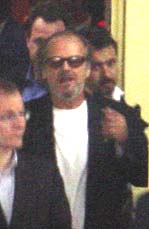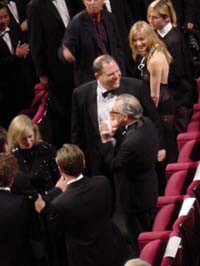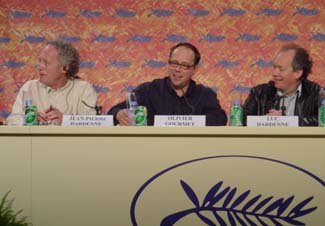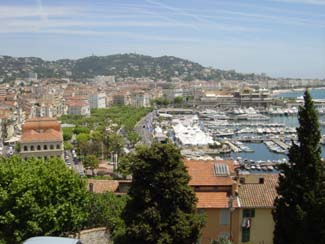|
The downside to the
nature of film festivals is that there is little time
to reflect before going to the next film. It is a factory
line, a cluster of collective memory, one film following
another until you can’t remember if a certain scene
or moment or theme was from this movie or that one. I’ve
met journalists, who see a great film in the afternoon,
and despite time for another film or two, find themselves
not seeing any more that day, content to just let the
great one stay with them, like the last bite of a nice
meal.
This happened for me with
About Schmidt, the new film by Alexander Payne
(Election) starring Jack Nicholson. Like Punchdrunk
Love, it nails that tone that allows for comedy and
tragedy to exist in the same moment, and does so with
a certain grace. About Schmidt is a look at mortality,
the life of a man in Omaha, Nebraska who lives a comfortable
if bland life. That’s how the film begins. Since
all the films here are new, with a few exceptions, we
are able to see them without any preconceived notions
or exposure to ad campaigns, and all audiences should,
ideally. So I say: it is a bit slow at times, but it is
quite good. When it is released, go and see it.
 |
Though it has been well-received
here, it did not compare to the reception of Nicholson
himself, looking the antithesis of the sad, pale, chubby,
combed-over character Schmidt. With his wide goatee, bronzed
face, longish hair and orange-tinted glasses, Nicholson
radiated his Jack-ness and only members of the elite press
were able to enter the press conference, the rest of us
watching it on TV monitors outside the doors. Nicholson
spoke, perhaps a bit too self-indulgently, about not watching
dailies for this film, not looking at himself in the mirror
for the duration of the whole shoot due to how… well,
unbearably un-Jack he was, sitting there in Omaha,
being filmed without lighting tricks to take away the
neck shadows in this, his most un-vain performance.
***
A day earlier,
Martin Scorsese, Leonardo DiCaprio and Cameron Diaz walked
up the red carpet to show an extended preview of his epic
period film Gangs of New York which will premiere
at the end of this year. Much like a CEO reporting to
stockholders, I couldn’t shake the idea that Scorsese
seemed to be making himself accountable when he didn’t
need to. Furthermore, it seemed awkward and unwise to
present 20 minutes of scenes from a film—unless it
was the opening chronological moments—because it
would effectively spoil the plot. But it seemed like a
unique opportunity, so I attended nonetheless. Before
showing the film, Scorsese took to the stage for an homage
to Billy Wilder. He spoke of his personal relationship
to the late director, and then showed scenes from Some
Like it Hot, The Apartment, Sabrina
and a few others. But it was clear the people here were
waiting to see the footage from Gangs of New York,
a year late in its release. The preview was paced interestingly,
an abbreviated version of the story that clearly indicated
the relationships between characters, giving perhaps too
much exposition, and ending with the standard trailer’s
quick succession of images set to bombastic music.
 |
What can be said about
a film based on its trailer? It tastes like chicken. It’s
a long commercial, so all we can really say is that has
great sets, nice production design, pretty actors, good
music, and some interesting lines of dialogue more melodramatic
than I had expected. That’s really all a trailer
can tell us, as we all know from seeing great trailers
for poor films. During its presentation, there were at
least a few dozen camera flashes, from people in the audience,
usually when DiCaprio was onscreen. The rest of the viewers
were a bit exasperated because the concept of film projection
is still unclear to these people, who will be surprised
to develop their film and find a blank white screen instead
of lovely Leo. This happens at every screening, where
people take flash photos of the Cannes logo before each
film. It would do the festival well to add a comment about
this along with the warning to turn off cell phones before
the films begin.
The area outside of the
press conference was a madhouse , leaving a sea of pushy,
near violent media wanting to get inside. Only a third
would be able to enter, those with the coveted white and
pink passes (Gadfly gets blue this year, but there is
always hope for next year), though there were still dozens
of media people who left the screening as it began in
order to get a good place in line for the conference.
Later, as I stood in this melee, I wondered if these people
are personally as unsavory as they appear to be as they
cut in line or exasperatedly complain to the security
personnel how there is some mistake, and they are being
unnecessarily screwed by the system, or if it is simply
the pressures of deadlines and needing to get quotes that
force their hand.
***
Earlier today
I saw Le Fils (The Son), by Belgian brothers Jean-Pierre
and Luc Dardennes. This is their third feature film after
years as documentary filmmakers, and all of their features
feel like non-fiction. As with their two previous
films, La Promesse and Rosetta (which won
the Palme d’Or at Cannes several years ago), Le
Fils is a minimalist story about people living in
Belgium. The stories begin in the middle of the lives
of the characters, who are often introverted, and end
without any sort of permanent resolution, giving us the
feeling that we are just peeking in on their lives at
this moment and that conflicts will continue, even those
raised in the film. Le Fils has no music at all,
is shot entirely hand-held often in long continuous shots,
and though you might not be able to put your finger on
it, is significantly devoid of frontal views. Instead,
the camera is literally over the shoulder of the characters,
following them around as they do things, looking at them
from the side. This film is about a carpenter, and aside
from the drama that is the plot of the film, we watch
him teach the craft, and spend time with him as he works
with the wood. It is a different kind of filmmaking, to
be sure, and also a different kind of acting as well.
Lead actor Olivier Gourmet, with his "everyman" looks
and demeanor explained after the film that he doesn’t
like historionics and "demonstrative acting with all its
tears." Because the film is more about his character doing
actions, and less about words or facial close-ups, Gourmet
said that it forces an actor to act with his whole being.
"I get the impression that I am acting with the back of
my neck, that I’ve got emotion there."
 |
The Dardennes do not put
marks down for their actors, meaning the places they are
supposed to be standing during a scene to achieve the
ideal lighting and focus. This adds to the sensation that
we are simply watching real people go about their lives.
All three of their films have carved out a certain style,
and due to their existential, sparse simplicity, find
an intelligent complexity about how real people live and
work.
***
Along the beach in Cannes,
near the main Palais, is the international village, a
series of well-outfitted tents representing different
nations attending the festival, a sort of film fest version
of EPCOT’s IllumiNations. There is the Irish Pavilion,
British Pavilion, Italian Pavilion and so on, with the
American Pavilion at the front, and possibly the largest.
It is Los Angeles transplanted, with its multiple cafes,
replete with veggie wraps and donuts, alimentations hard
to come by in France. There are a dozen high speed computer
terminals as well and some office space for certain major
U.S. media. Inadvertently I stepped into an area that
unlike the rest of the pavilion is not all-access. A guy
working for an American TV station, wearing a T-shirt
and shorts, coarsely and arrogantly told me to get out
of their area due to it technically being an office where
there was some TV equipment. When I questioned his rudeness,
he got in my face until his colleague calmly told him,
without looking up at us, "Okay, it’s over, man,
let it go."
 |
Whether it is simply ego
or the pressures of the job, this is just Cannes, man,
not Yalta.
www.festival-cannes.com
Cannes Notebook
#1
Cannes Notebook#2
|